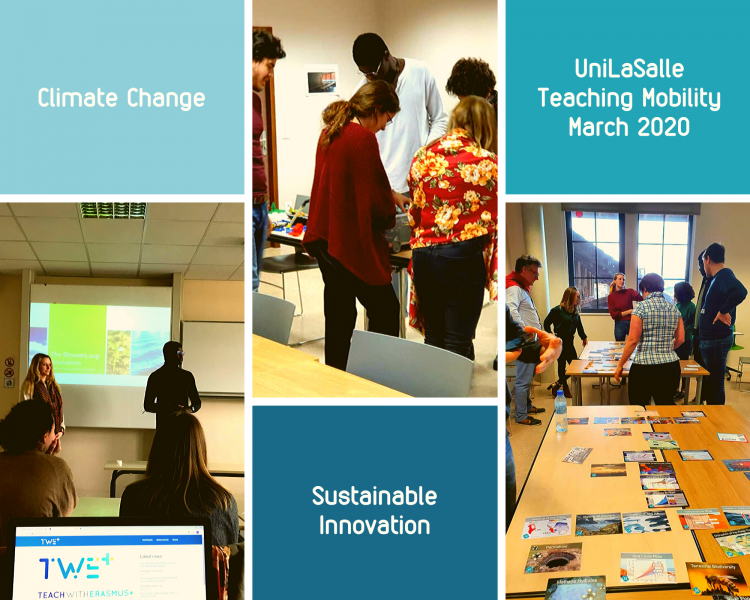Nathalie Schnuriger, Organizer of the first teaching mobility pilot in Beauvais, France within the Teach with Erasmus+ project
Institut Polytechnique UniLaSalle
How did you decide on the main topic, the participants and the audience of this teaching mobility?
At first, we decided on the topic, climate change and sustainable innovation. We already have a few events in our academic calendar that focuses on climate change. I was in charge of the intensive program that is integrated into the master’s program of geoscience students. They can choose from three different streams about entrepreneurship; however, this is not a mandatory element of their course. We combined this program and the teaching mobility, because I have professional relations in the field of climate change worldwide, so I wanted to involve both the students and the teachers into sustainable and climate entrepreneurship.
After having the 11 participants from the geoscience master’s program, we sent out the call to our partner universities, and we received 12 applications from teachers. Five or six applications were very coherent with the core topic, and we selected the four applications that were the most relevant for the students. The selected teachers have expertise that we do not have at our university, so we hoped that they will bring their knowledge to our students. Due to various reasons, two teachers were present for the whole 1-week mobility.
What message do you want to deliver with this mobility?
I wanted to provide the opportunity for the students to meet professors with knowledge and experience that we do not have at UniLaSalle. I also wanted to create an open space with this mobility, so those who are not experts of climate change, can learn about this field.
What did you expect from this mobility?
My main goal was to think outside of the box, and to show this to the students. The teachers who we selected did provide this approach. These kinds of projects push us out of our comfort zone and make us act for our cause. The entrepreneurial approach helps us to create sustainable and affordable solutions to change our businesses.
In the future I am planning to create a pedagogical toolbox on how to teach climate issues in the universities.
Which part did you find the most useful?
One of the teachers, Justas Kažys did a conference on art, it was one of the peak points of the week for me. From my activist point of view, it was nice to see that it can shake people, it can shift positions and it can push them out of their comfort zone. At first, the students found this art activity childish, but then it made them move and act.
Another interesting presentation came from Keith Larson via Skype, who works at the CIRC (Climate Impacts Research Centre). His talk was about Nordic environmental issues. He pointed out that the question was not believe or not in climate change, but now he could see how it is happening in front of his eyes.
The students had their free time to work on their projects and they created real, feasible solutions to climate change issues. They had a chance to go out of their comfort zones and learn new things from international teachers.
In my opinion it was an eye-opening event about the impacts of climate change and the importance of sustainable entrepreneurship. In the future, the students can implement this approach into their work, because we cannot keep business as usual anymore.
What could be the next step after this mobility week?
I hope that more and more university joins to the mobility weeks, and parallelly a lot of activities can happen on different campuses. This would also create a network of professors, and links between academic and student activities and our daily lives in relation to climate change. It would be great to grow internationally and make influence on policymakers.
The next step could be a multi-stakeholder project about regenerative economy and business models. To be more demonstrative and more operational, we could plan to invite entrepreneurs who can help us act.
Another impact of this mobility is that the French students have English classes for a week. This is a nice way to practice their language skills and they experience having international professors.

